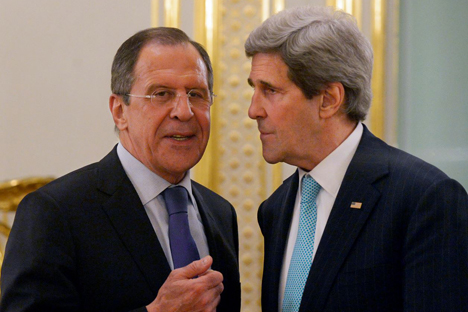Assad’s fate stymies Russia, U.S. accord on Syria

Russian Foreign Minister Sergei Lavrov (left) and U.S. Secretary of State John Kerry. Source: flickr.com / Eduard Peskov, Russia's Foreign Ministry
Autumn has arrived in the midst of intensive yet protracted consultations on the Syrian crisis. Not only diplomats from Russia and the United States, but military officials from both countries are also discussing the issue threadbare. They are not, however, talking of a joint front against ISIS terrorists, but how to prevent possible incidents.
A source in the Russian Foreign Ministry said Washington might be given all the necessary information regarding Moscow's collaboration with Damascus, through the restored communication channels between the U.S. and Russian defence ministries.
The main issue of contention, however, remains unresolved: the fate of Syrian President Bashar al-Assad. The U.S. wants him to stand down, arguing that he bears responsibility for the entire conflict by waging war on his own people, while Russia insists that the Syrians themselves must decide the fate of their leader, without external involvement.
Meanwhile, news of Russia's intensified military cooperation with Syria has alarmed Israel.
Prime Minister Benjamin Netanyahu flew to Moscow on September 21, bringing with him the heads of the country’s military.
His meeting with Russian President Vladimir Putin resulted in them agreeing to form a group that will create a mechanism to coordinate actions in the "air, sea and electromagnetic spheres," so as to minimize unintended clashes and other incidents in Syria.
Is Washington softening its position?
Analysts to whom RIR spoke believe the settlement of the Iranian nuclear problem and Moscow's more active role in Syria could help extricate the situation from the impasse in which it is currently lodged.
Georgy Mirsky, of the Institute of World Economy and International Relations at the Russian Academy of Sciences, felt there have recently been perceptible changes in Washington’s rhetoric on Assad. Even though the White House continues to insist that Assad must leave, it makes no mention of the framework for his "departure" and does not exclude sitting down with the Syrian leader at the negotiating table.
"We're prepared to negotiate. Is Assad prepared to negotiate, really negotiate? Is Russia prepared to bring him to the table?" said U.S. Secretary of State John Kerry.
Mirsky links the changes in Washington’s approach to the Syrian leader primarily to the agreement on Iran's nuclear programme.
"After the deal was reached with Tehran on the Iranian nuclear programme, Assad ceased to be an ally of the enemy," he said.
In his opinion, the main opponent for the U.S. in Syria is now the Islamic State in Syria, not Assad: "If the ISIS extremists come to power in Syria, it will be a blow to the security of the whole region. And Obama will go down in history as the American president who surrendered Damascus to the terrorists,” Mirsky said.
Three scenarios
Analysts foresee at least three likely scenarios concerning Syria's future: resolving the conflict with Assad, reaching a settlement without him, or the protraction of the conflict.
"The scenario in which Assad remains is the least likely because the U.S. has already spent a lot of resources on his overthrow and will not admit to defeat," said Tatyana Tyukayeva, a professor at the Moscow State Institute of International Relations and expert at the Foreign Policy Analytical Centre.
"For the U.S. Assad is a lesser evil, if compared to ISIS,” said Mirsky. “But if Obama decides to leave Assad in place, he will be severely criticized.”
A preferred scenario, according to the analysts, is one in which the Syrian regime remains but Assad leaves.
"The option of the regime formally remaining is more preferable. But the positions of influential regional players such as Turkey, Saudi Arabia and Qatar will hinder the realization of this option," said Tyukayeva.
"The most probable outcome is the protraction of the conflict, in the course of which Turkey, Saudi Arabia and Qatar will attempt to wear out the regime through loyal Islamist groups.”
All rights reserved by Rossiyskaya Gazeta.
Subscribe
to our newsletter!
Get the week's best stories straight to your inbox
